An Analysis of Femininity, Consumerism, and its Societal Impact
VerifiedAdded on 2020/11/23
|9
|2898
|205
Essay
AI Summary
This sociology essay delves into the intricate relationship between femininity and consumerism in contemporary society. The essay begins by defining femininity in the modern context, acknowledging its socially constructed nature and its association with perfection. It then explores feminist theory, examining gender inequalities, discrimination, and the impact of media and consumer culture on women. The essay critically evaluates the limitations of feminist theory, particularly in its explanation of male and female discrimination. Furthermore, it analyzes the myth of consumerism, illustrating how mass media manipulates women to increase sales, and discusses the impact of femininity on society, including how images of women are used in advertisements. The essay explores how the fashion industry and media portray both men and women. The essay concludes by considering the impact of femininity and consumerism on society, including how the images of women are used in advertising, and the impact on social constructs and ethics.
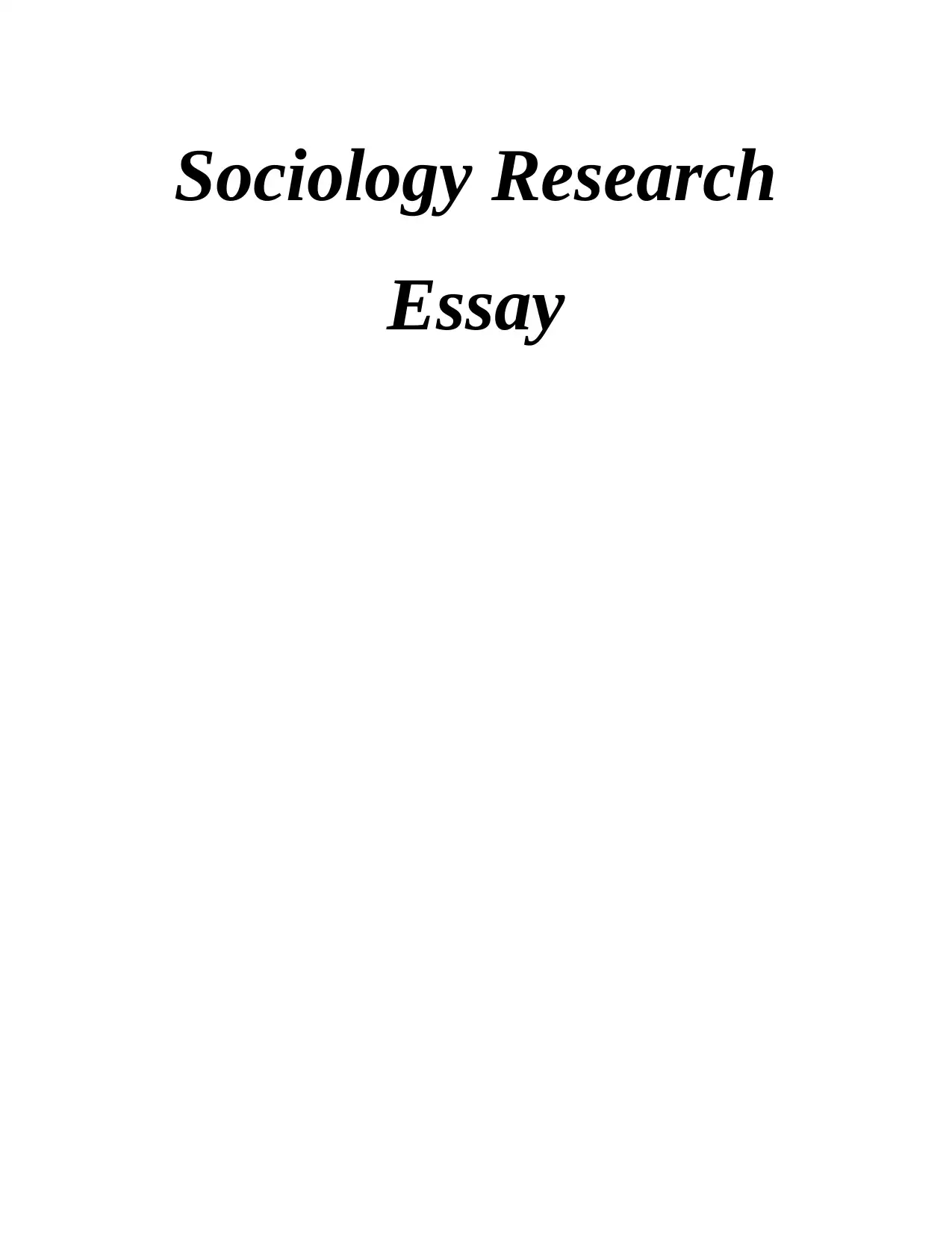
Sociology Research
Essay
Essay
Paraphrase This Document
Need a fresh take? Get an instant paraphrase of this document with our AI Paraphraser
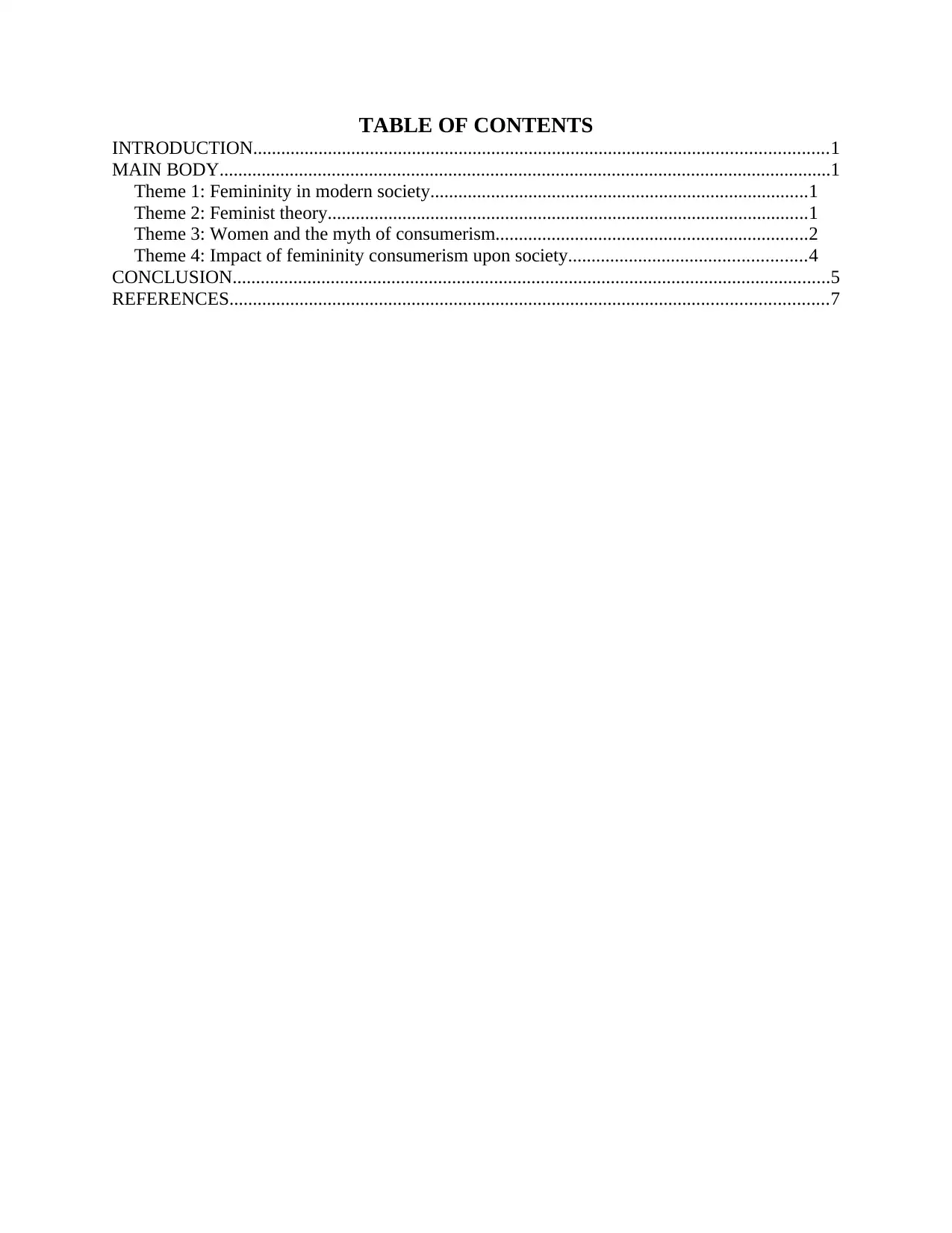
TABLE OF CONTENTS
INTRODUCTION...........................................................................................................................1
MAIN BODY...................................................................................................................................1
Theme 1: Femininity in modern society.................................................................................1
Theme 2: Feminist theory.......................................................................................................1
Theme 3: Women and the myth of consumerism...................................................................2
Theme 4: Impact of femininity consumerism upon society...................................................4
CONCLUSION................................................................................................................................5
REFERENCES................................................................................................................................7
INTRODUCTION...........................................................................................................................1
MAIN BODY...................................................................................................................................1
Theme 1: Femininity in modern society.................................................................................1
Theme 2: Feminist theory.......................................................................................................1
Theme 3: Women and the myth of consumerism...................................................................2
Theme 4: Impact of femininity consumerism upon society...................................................4
CONCLUSION................................................................................................................................5
REFERENCES................................................................................................................................7
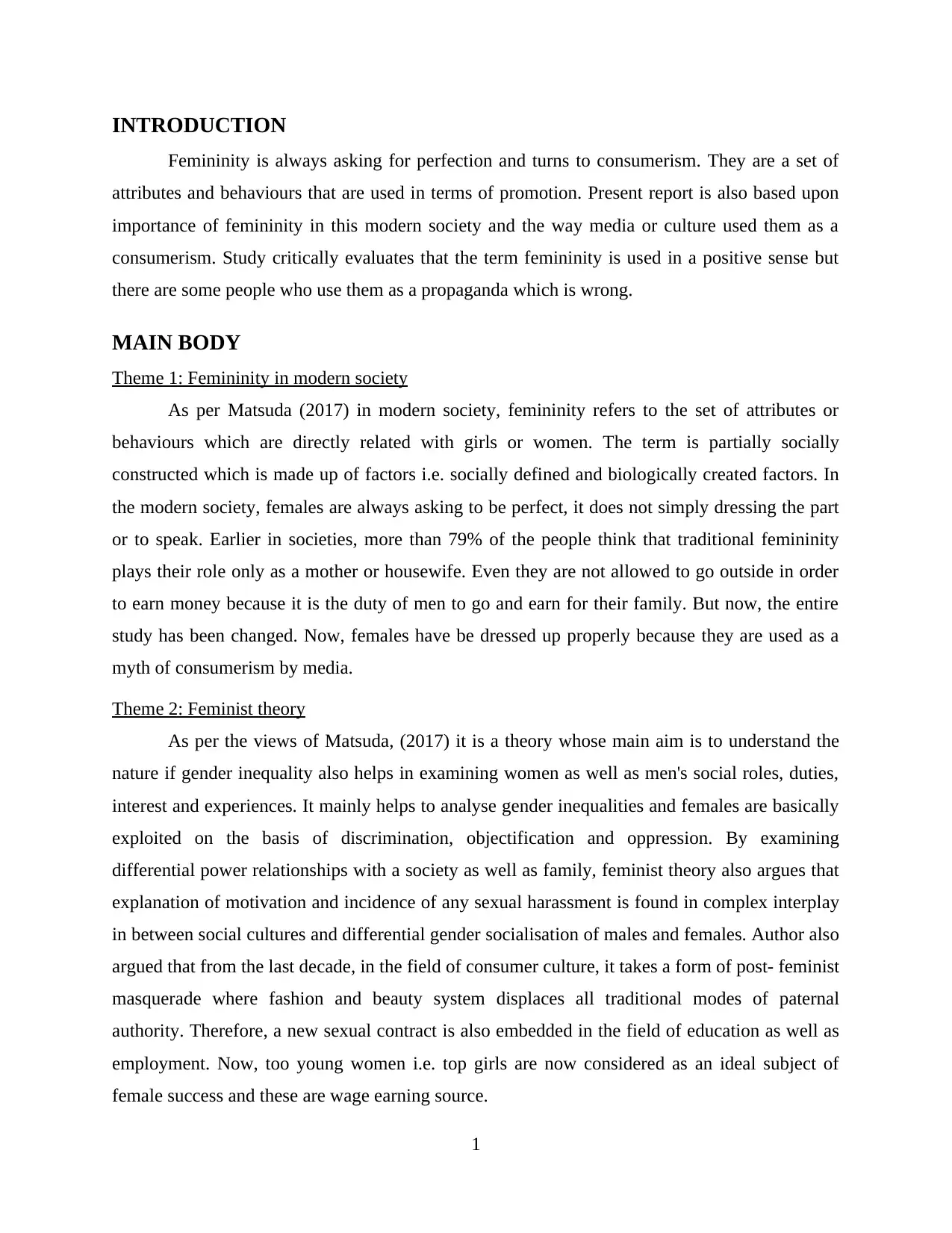
INTRODUCTION
Femininity is always asking for perfection and turns to consumerism. They are a set of
attributes and behaviours that are used in terms of promotion. Present report is also based upon
importance of femininity in this modern society and the way media or culture used them as a
consumerism. Study critically evaluates that the term femininity is used in a positive sense but
there are some people who use them as a propaganda which is wrong.
MAIN BODY
Theme 1: Femininity in modern society
As per Matsuda (2017) in modern society, femininity refers to the set of attributes or
behaviours which are directly related with girls or women. The term is partially socially
constructed which is made up of factors i.e. socially defined and biologically created factors. In
the modern society, females are always asking to be perfect, it does not simply dressing the part
or to speak. Earlier in societies, more than 79% of the people think that traditional femininity
plays their role only as a mother or housewife. Even they are not allowed to go outside in order
to earn money because it is the duty of men to go and earn for their family. But now, the entire
study has been changed. Now, females have be dressed up properly because they are used as a
myth of consumerism by media.
Theme 2: Feminist theory
As per the views of Matsuda, (2017) it is a theory whose main aim is to understand the
nature if gender inequality also helps in examining women as well as men's social roles, duties,
interest and experiences. It mainly helps to analyse gender inequalities and females are basically
exploited on the basis of discrimination, objectification and oppression. By examining
differential power relationships with a society as well as family, feminist theory also argues that
explanation of motivation and incidence of any sexual harassment is found in complex interplay
in between social cultures and differential gender socialisation of males and females. Author also
argued that from the last decade, in the field of consumer culture, it takes a form of post- feminist
masquerade where fashion and beauty system displaces all traditional modes of paternal
authority. Therefore, a new sexual contract is also embedded in the field of education as well as
employment. Now, too young women i.e. top girls are now considered as an ideal subject of
female success and these are wage earning source.
1
Femininity is always asking for perfection and turns to consumerism. They are a set of
attributes and behaviours that are used in terms of promotion. Present report is also based upon
importance of femininity in this modern society and the way media or culture used them as a
consumerism. Study critically evaluates that the term femininity is used in a positive sense but
there are some people who use them as a propaganda which is wrong.
MAIN BODY
Theme 1: Femininity in modern society
As per Matsuda (2017) in modern society, femininity refers to the set of attributes or
behaviours which are directly related with girls or women. The term is partially socially
constructed which is made up of factors i.e. socially defined and biologically created factors. In
the modern society, females are always asking to be perfect, it does not simply dressing the part
or to speak. Earlier in societies, more than 79% of the people think that traditional femininity
plays their role only as a mother or housewife. Even they are not allowed to go outside in order
to earn money because it is the duty of men to go and earn for their family. But now, the entire
study has been changed. Now, females have be dressed up properly because they are used as a
myth of consumerism by media.
Theme 2: Feminist theory
As per the views of Matsuda, (2017) it is a theory whose main aim is to understand the
nature if gender inequality also helps in examining women as well as men's social roles, duties,
interest and experiences. It mainly helps to analyse gender inequalities and females are basically
exploited on the basis of discrimination, objectification and oppression. By examining
differential power relationships with a society as well as family, feminist theory also argues that
explanation of motivation and incidence of any sexual harassment is found in complex interplay
in between social cultures and differential gender socialisation of males and females. Author also
argued that from the last decade, in the field of consumer culture, it takes a form of post- feminist
masquerade where fashion and beauty system displaces all traditional modes of paternal
authority. Therefore, a new sexual contract is also embedded in the field of education as well as
employment. Now, too young women i.e. top girls are now considered as an ideal subject of
female success and these are wage earning source.
1
⊘ This is a preview!⊘
Do you want full access?
Subscribe today to unlock all pages.

Trusted by 1+ million students worldwide
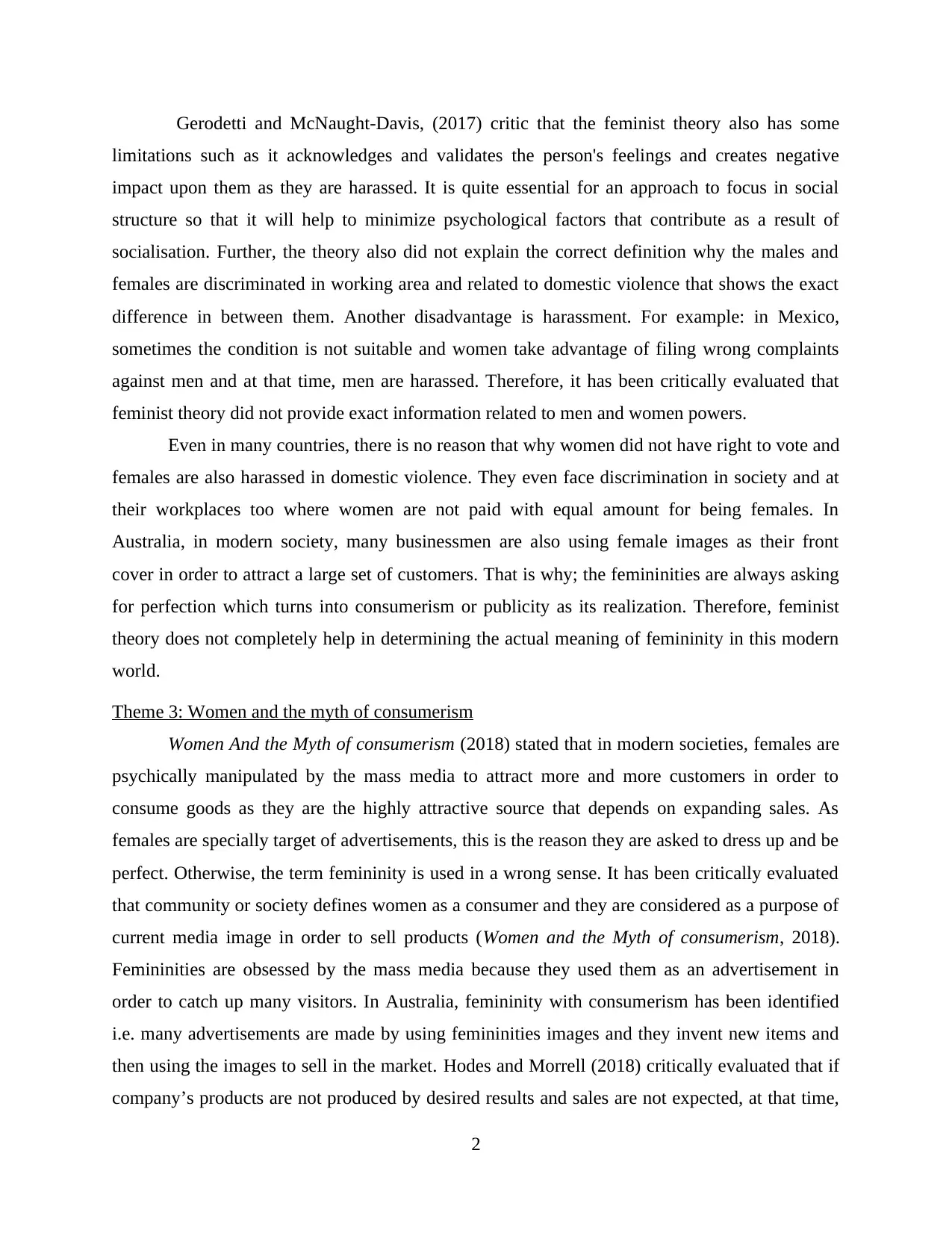
Gerodetti and McNaught-Davis, (2017) critic that the feminist theory also has some
limitations such as it acknowledges and validates the person's feelings and creates negative
impact upon them as they are harassed. It is quite essential for an approach to focus in social
structure so that it will help to minimize psychological factors that contribute as a result of
socialisation. Further, the theory also did not explain the correct definition why the males and
females are discriminated in working area and related to domestic violence that shows the exact
difference in between them. Another disadvantage is harassment. For example: in Mexico,
sometimes the condition is not suitable and women take advantage of filing wrong complaints
against men and at that time, men are harassed. Therefore, it has been critically evaluated that
feminist theory did not provide exact information related to men and women powers.
Even in many countries, there is no reason that why women did not have right to vote and
females are also harassed in domestic violence. They even face discrimination in society and at
their workplaces too where women are not paid with equal amount for being females. In
Australia, in modern society, many businessmen are also using female images as their front
cover in order to attract a large set of customers. That is why; the femininities are always asking
for perfection which turns into consumerism or publicity as its realization. Therefore, feminist
theory does not completely help in determining the actual meaning of femininity in this modern
world.
Theme 3: Women and the myth of consumerism
Women And the Myth of consumerism (2018) stated that in modern societies, females are
psychically manipulated by the mass media to attract more and more customers in order to
consume goods as they are the highly attractive source that depends on expanding sales. As
females are specially target of advertisements, this is the reason they are asked to dress up and be
perfect. Otherwise, the term femininity is used in a wrong sense. It has been critically evaluated
that community or society defines women as a consumer and they are considered as a purpose of
current media image in order to sell products (Women and the Myth of consumerism, 2018).
Femininities are obsessed by the mass media because they used them as an advertisement in
order to catch up many visitors. In Australia, femininity with consumerism has been identified
i.e. many advertisements are made by using femininities images and they invent new items and
then using the images to sell in the market. Hodes and Morrell (2018) critically evaluated that if
company’s products are not produced by desired results and sales are not expected, at that time,
2
limitations such as it acknowledges and validates the person's feelings and creates negative
impact upon them as they are harassed. It is quite essential for an approach to focus in social
structure so that it will help to minimize psychological factors that contribute as a result of
socialisation. Further, the theory also did not explain the correct definition why the males and
females are discriminated in working area and related to domestic violence that shows the exact
difference in between them. Another disadvantage is harassment. For example: in Mexico,
sometimes the condition is not suitable and women take advantage of filing wrong complaints
against men and at that time, men are harassed. Therefore, it has been critically evaluated that
feminist theory did not provide exact information related to men and women powers.
Even in many countries, there is no reason that why women did not have right to vote and
females are also harassed in domestic violence. They even face discrimination in society and at
their workplaces too where women are not paid with equal amount for being females. In
Australia, in modern society, many businessmen are also using female images as their front
cover in order to attract a large set of customers. That is why; the femininities are always asking
for perfection which turns into consumerism or publicity as its realization. Therefore, feminist
theory does not completely help in determining the actual meaning of femininity in this modern
world.
Theme 3: Women and the myth of consumerism
Women And the Myth of consumerism (2018) stated that in modern societies, females are
psychically manipulated by the mass media to attract more and more customers in order to
consume goods as they are the highly attractive source that depends on expanding sales. As
females are specially target of advertisements, this is the reason they are asked to dress up and be
perfect. Otherwise, the term femininity is used in a wrong sense. It has been critically evaluated
that community or society defines women as a consumer and they are considered as a purpose of
current media image in order to sell products (Women and the Myth of consumerism, 2018).
Femininities are obsessed by the mass media because they used them as an advertisement in
order to catch up many visitors. In Australia, femininity with consumerism has been identified
i.e. many advertisements are made by using femininities images and they invent new items and
then using the images to sell in the market. Hodes and Morrell (2018) critically evaluated that if
company’s products are not produced by desired results and sales are not expected, at that time,
2
Paraphrase This Document
Need a fresh take? Get an instant paraphrase of this document with our AI Paraphraser
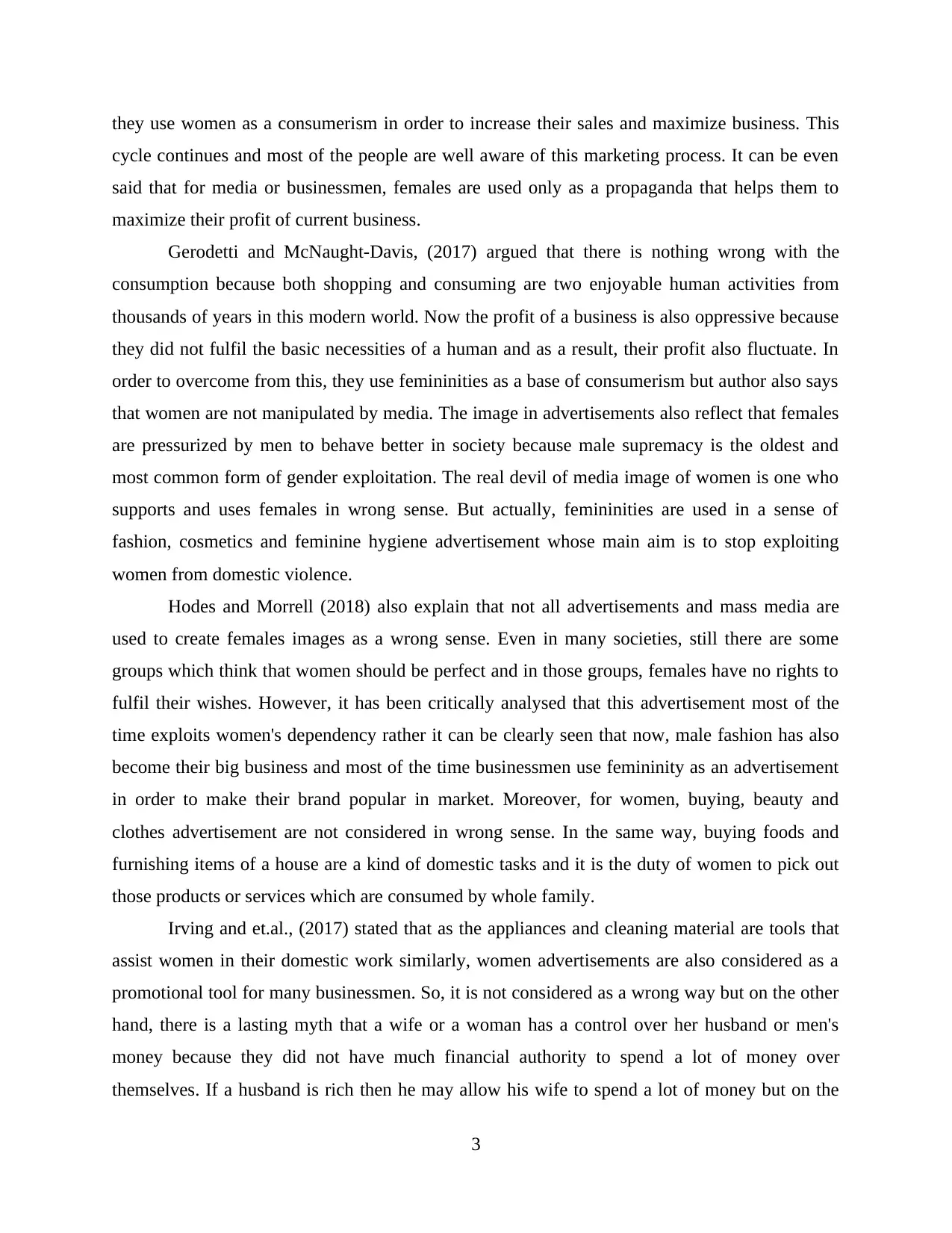
they use women as a consumerism in order to increase their sales and maximize business. This
cycle continues and most of the people are well aware of this marketing process. It can be even
said that for media or businessmen, females are used only as a propaganda that helps them to
maximize their profit of current business.
Gerodetti and McNaught-Davis, (2017) argued that there is nothing wrong with the
consumption because both shopping and consuming are two enjoyable human activities from
thousands of years in this modern world. Now the profit of a business is also oppressive because
they did not fulfil the basic necessities of a human and as a result, their profit also fluctuate. In
order to overcome from this, they use femininities as a base of consumerism but author also says
that women are not manipulated by media. The image in advertisements also reflect that females
are pressurized by men to behave better in society because male supremacy is the oldest and
most common form of gender exploitation. The real devil of media image of women is one who
supports and uses females in wrong sense. But actually, femininities are used in a sense of
fashion, cosmetics and feminine hygiene advertisement whose main aim is to stop exploiting
women from domestic violence.
Hodes and Morrell (2018) also explain that not all advertisements and mass media are
used to create females images as a wrong sense. Even in many societies, still there are some
groups which think that women should be perfect and in those groups, females have no rights to
fulfil their wishes. However, it has been critically analysed that this advertisement most of the
time exploits women's dependency rather it can be clearly seen that now, male fashion has also
become their big business and most of the time businessmen use femininity as an advertisement
in order to make their brand popular in market. Moreover, for women, buying, beauty and
clothes advertisement are not considered in wrong sense. In the same way, buying foods and
furnishing items of a house are a kind of domestic tasks and it is the duty of women to pick out
those products or services which are consumed by whole family.
Irving and et.al., (2017) stated that as the appliances and cleaning material are tools that
assist women in their domestic work similarly, women advertisements are also considered as a
promotional tool for many businessmen. So, it is not considered as a wrong way but on the other
hand, there is a lasting myth that a wife or a woman has a control over her husband or men's
money because they did not have much financial authority to spend a lot of money over
themselves. If a husband is rich then he may allow his wife to spend a lot of money but on the
3
cycle continues and most of the people are well aware of this marketing process. It can be even
said that for media or businessmen, females are used only as a propaganda that helps them to
maximize their profit of current business.
Gerodetti and McNaught-Davis, (2017) argued that there is nothing wrong with the
consumption because both shopping and consuming are two enjoyable human activities from
thousands of years in this modern world. Now the profit of a business is also oppressive because
they did not fulfil the basic necessities of a human and as a result, their profit also fluctuate. In
order to overcome from this, they use femininities as a base of consumerism but author also says
that women are not manipulated by media. The image in advertisements also reflect that females
are pressurized by men to behave better in society because male supremacy is the oldest and
most common form of gender exploitation. The real devil of media image of women is one who
supports and uses females in wrong sense. But actually, femininities are used in a sense of
fashion, cosmetics and feminine hygiene advertisement whose main aim is to stop exploiting
women from domestic violence.
Hodes and Morrell (2018) also explain that not all advertisements and mass media are
used to create females images as a wrong sense. Even in many societies, still there are some
groups which think that women should be perfect and in those groups, females have no rights to
fulfil their wishes. However, it has been critically analysed that this advertisement most of the
time exploits women's dependency rather it can be clearly seen that now, male fashion has also
become their big business and most of the time businessmen use femininity as an advertisement
in order to make their brand popular in market. Moreover, for women, buying, beauty and
clothes advertisement are not considered in wrong sense. In the same way, buying foods and
furnishing items of a house are a kind of domestic tasks and it is the duty of women to pick out
those products or services which are consumed by whole family.
Irving and et.al., (2017) stated that as the appliances and cleaning material are tools that
assist women in their domestic work similarly, women advertisements are also considered as a
promotional tool for many businessmen. So, it is not considered as a wrong way but on the other
hand, there is a lasting myth that a wife or a woman has a control over her husband or men's
money because they did not have much financial authority to spend a lot of money over
themselves. If a husband is rich then he may allow his wife to spend a lot of money but on the
3
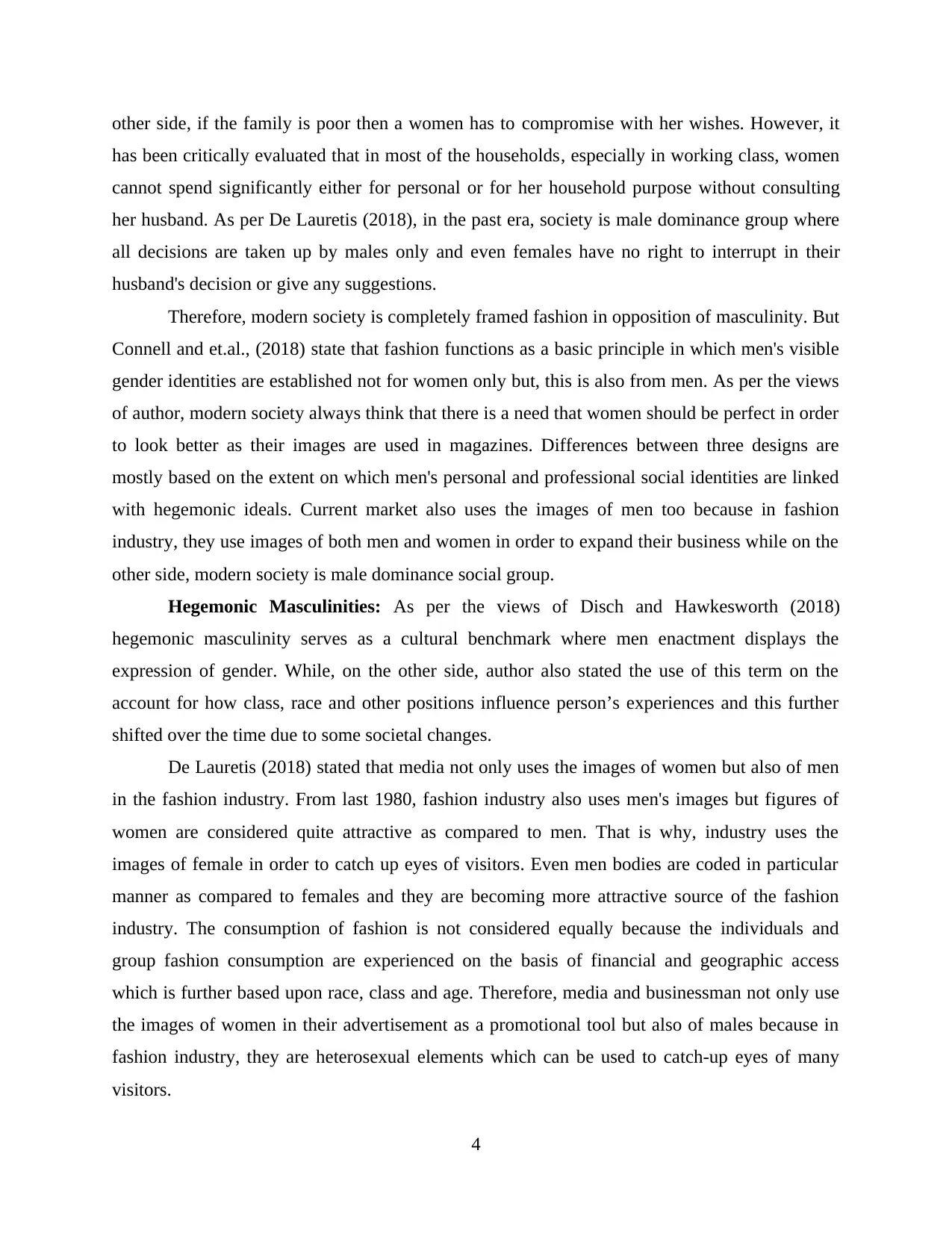
other side, if the family is poor then a women has to compromise with her wishes. However, it
has been critically evaluated that in most of the households, especially in working class, women
cannot spend significantly either for personal or for her household purpose without consulting
her husband. As per De Lauretis (2018), in the past era, society is male dominance group where
all decisions are taken up by males only and even females have no right to interrupt in their
husband's decision or give any suggestions.
Therefore, modern society is completely framed fashion in opposition of masculinity. But
Connell and et.al., (2018) state that fashion functions as a basic principle in which men's visible
gender identities are established not for women only but, this is also from men. As per the views
of author, modern society always think that there is a need that women should be perfect in order
to look better as their images are used in magazines. Differences between three designs are
mostly based on the extent on which men's personal and professional social identities are linked
with hegemonic ideals. Current market also uses the images of men too because in fashion
industry, they use images of both men and women in order to expand their business while on the
other side, modern society is male dominance social group.
Hegemonic Masculinities: As per the views of Disch and Hawkesworth (2018)
hegemonic masculinity serves as a cultural benchmark where men enactment displays the
expression of gender. While, on the other side, author also stated the use of this term on the
account for how class, race and other positions influence person’s experiences and this further
shifted over the time due to some societal changes.
De Lauretis (2018) stated that media not only uses the images of women but also of men
in the fashion industry. From last 1980, fashion industry also uses men's images but figures of
women are considered quite attractive as compared to men. That is why, industry uses the
images of female in order to catch up eyes of visitors. Even men bodies are coded in particular
manner as compared to females and they are becoming more attractive source of the fashion
industry. The consumption of fashion is not considered equally because the individuals and
group fashion consumption are experienced on the basis of financial and geographic access
which is further based upon race, class and age. Therefore, media and businessman not only use
the images of women in their advertisement as a promotional tool but also of males because in
fashion industry, they are heterosexual elements which can be used to catch-up eyes of many
visitors.
4
has been critically evaluated that in most of the households, especially in working class, women
cannot spend significantly either for personal or for her household purpose without consulting
her husband. As per De Lauretis (2018), in the past era, society is male dominance group where
all decisions are taken up by males only and even females have no right to interrupt in their
husband's decision or give any suggestions.
Therefore, modern society is completely framed fashion in opposition of masculinity. But
Connell and et.al., (2018) state that fashion functions as a basic principle in which men's visible
gender identities are established not for women only but, this is also from men. As per the views
of author, modern society always think that there is a need that women should be perfect in order
to look better as their images are used in magazines. Differences between three designs are
mostly based on the extent on which men's personal and professional social identities are linked
with hegemonic ideals. Current market also uses the images of men too because in fashion
industry, they use images of both men and women in order to expand their business while on the
other side, modern society is male dominance social group.
Hegemonic Masculinities: As per the views of Disch and Hawkesworth (2018)
hegemonic masculinity serves as a cultural benchmark where men enactment displays the
expression of gender. While, on the other side, author also stated the use of this term on the
account for how class, race and other positions influence person’s experiences and this further
shifted over the time due to some societal changes.
De Lauretis (2018) stated that media not only uses the images of women but also of men
in the fashion industry. From last 1980, fashion industry also uses men's images but figures of
women are considered quite attractive as compared to men. That is why, industry uses the
images of female in order to catch up eyes of visitors. Even men bodies are coded in particular
manner as compared to females and they are becoming more attractive source of the fashion
industry. The consumption of fashion is not considered equally because the individuals and
group fashion consumption are experienced on the basis of financial and geographic access
which is further based upon race, class and age. Therefore, media and businessman not only use
the images of women in their advertisement as a promotional tool but also of males because in
fashion industry, they are heterosexual elements which can be used to catch-up eyes of many
visitors.
4
⊘ This is a preview!⊘
Do you want full access?
Subscribe today to unlock all pages.

Trusted by 1+ million students worldwide

Theme 4: Impact of femininity consumerism upon society
Price and Shildrick (2017) stated that femininity does not mean to manipulate females but
it is an idea of studying cultural and ethics of some specific group so that each formation will be
different from other. A female blogger is perfect as the author says. When an image of any
female is used as an advertising purpose that does not mean media wants to expose them.
However, the image of perfection does not match with the reality of others and not fit other
social realities as the image of rich female blogger. As many businessman and others use image
of women for the purpose of publicity, it does not mean that they are exploiting them. While, on
the other side, Allen (2018) stated that in 90s, sexual contract directly creates impact upon
modern society as he also investigated that how in modern era, media culture and female
consumerism; both contributed to the sexual contract and only this approach helps to identify
them as a consumer choice in the form of political participation.
Crenshaw (2018) critics that feminist advertisements recreate the images of gender and
offers them a perfect intermediate for their promotions. He also argues that many women
magazines not merely reflect female’s role in society but also, supplies the source of
socialisation. Moreover, decision of choosing the advertisement inside a women's magazine is
such a trend of an object that helps to motivate primarily not to uncover about what societies and
cultures are stated. Therefore, he also claimed that the role of a woman in an advertisement is
traditionally an object that helps to catch up eyes of many visitors in the modern society with
gender equality. In the current era, role of females are changed into more neutral and liberal
direction and even media uses plenty of images for both men and women in order to promote the
idea of feminine as an object of heterosexual desire where feminine appearance and behaviour
are considered as a narrow concept.
Therefore, it has been proved that in modern society, businessmen and mass of media use
female images as a promotional tool but it does not mean that they are used in a wrong sense.
Rather, both male and female images are used as a promotional tool in fashion industry to catch
up eyes of many viewers so that directly or indirectly, company's sales or profit can be
maximized. But the media platforms are mostly used by women in order to maintain their place
in post-feminist era.
5
Price and Shildrick (2017) stated that femininity does not mean to manipulate females but
it is an idea of studying cultural and ethics of some specific group so that each formation will be
different from other. A female blogger is perfect as the author says. When an image of any
female is used as an advertising purpose that does not mean media wants to expose them.
However, the image of perfection does not match with the reality of others and not fit other
social realities as the image of rich female blogger. As many businessman and others use image
of women for the purpose of publicity, it does not mean that they are exploiting them. While, on
the other side, Allen (2018) stated that in 90s, sexual contract directly creates impact upon
modern society as he also investigated that how in modern era, media culture and female
consumerism; both contributed to the sexual contract and only this approach helps to identify
them as a consumer choice in the form of political participation.
Crenshaw (2018) critics that feminist advertisements recreate the images of gender and
offers them a perfect intermediate for their promotions. He also argues that many women
magazines not merely reflect female’s role in society but also, supplies the source of
socialisation. Moreover, decision of choosing the advertisement inside a women's magazine is
such a trend of an object that helps to motivate primarily not to uncover about what societies and
cultures are stated. Therefore, he also claimed that the role of a woman in an advertisement is
traditionally an object that helps to catch up eyes of many visitors in the modern society with
gender equality. In the current era, role of females are changed into more neutral and liberal
direction and even media uses plenty of images for both men and women in order to promote the
idea of feminine as an object of heterosexual desire where feminine appearance and behaviour
are considered as a narrow concept.
Therefore, it has been proved that in modern society, businessmen and mass of media use
female images as a promotional tool but it does not mean that they are used in a wrong sense.
Rather, both male and female images are used as a promotional tool in fashion industry to catch
up eyes of many viewers so that directly or indirectly, company's sales or profit can be
maximized. But the media platforms are mostly used by women in order to maintain their place
in post-feminist era.
5
Paraphrase This Document
Need a fresh take? Get an instant paraphrase of this document with our AI Paraphraser
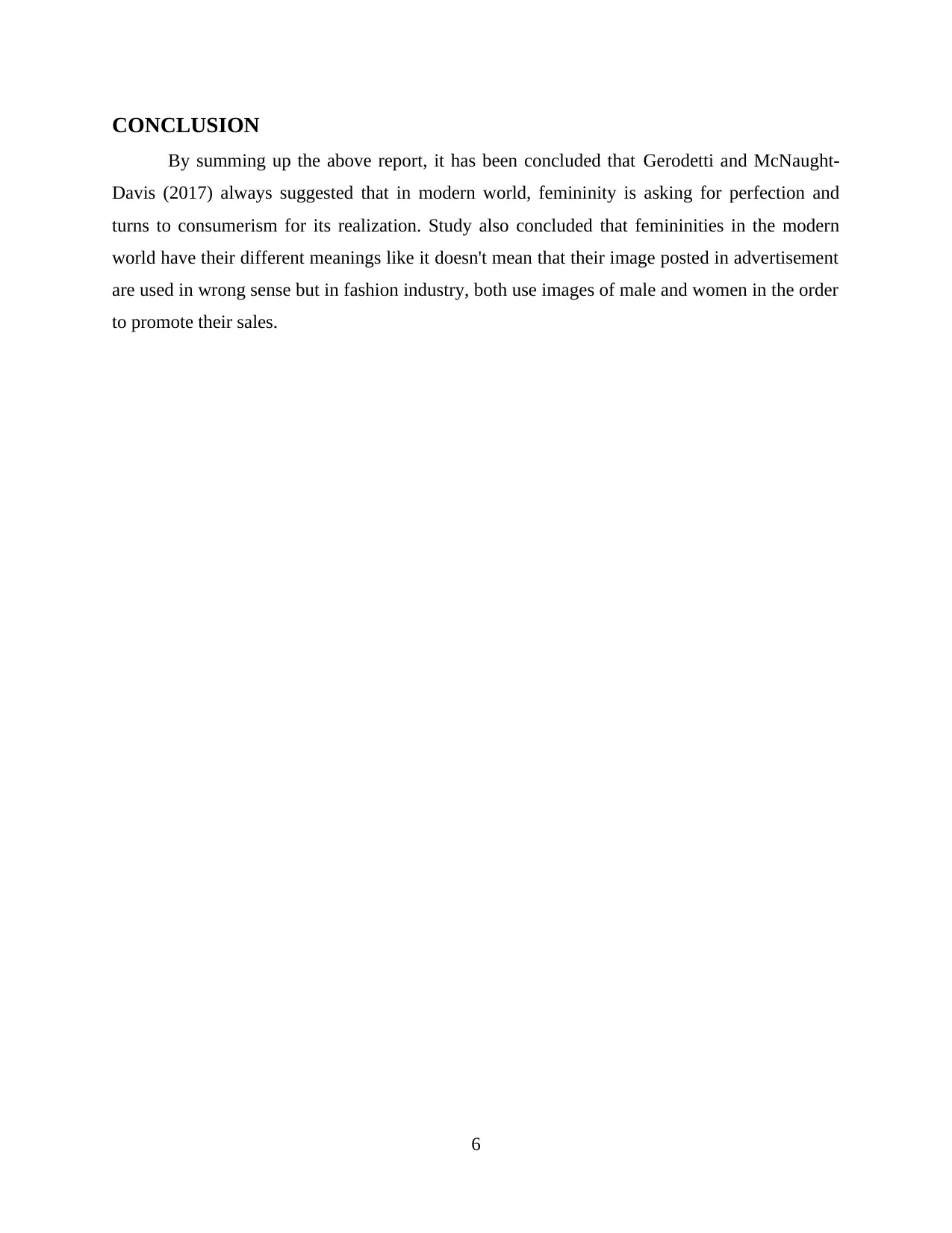
CONCLUSION
By summing up the above report, it has been concluded that Gerodetti and McNaught-
Davis (2017) always suggested that in modern world, femininity is asking for perfection and
turns to consumerism for its realization. Study also concluded that femininities in the modern
world have their different meanings like it doesn't mean that their image posted in advertisement
are used in wrong sense but in fashion industry, both use images of male and women in the order
to promote their sales.
6
By summing up the above report, it has been concluded that Gerodetti and McNaught-
Davis (2017) always suggested that in modern world, femininity is asking for perfection and
turns to consumerism for its realization. Study also concluded that femininities in the modern
world have their different meanings like it doesn't mean that their image posted in advertisement
are used in wrong sense but in fashion industry, both use images of male and women in the order
to promote their sales.
6
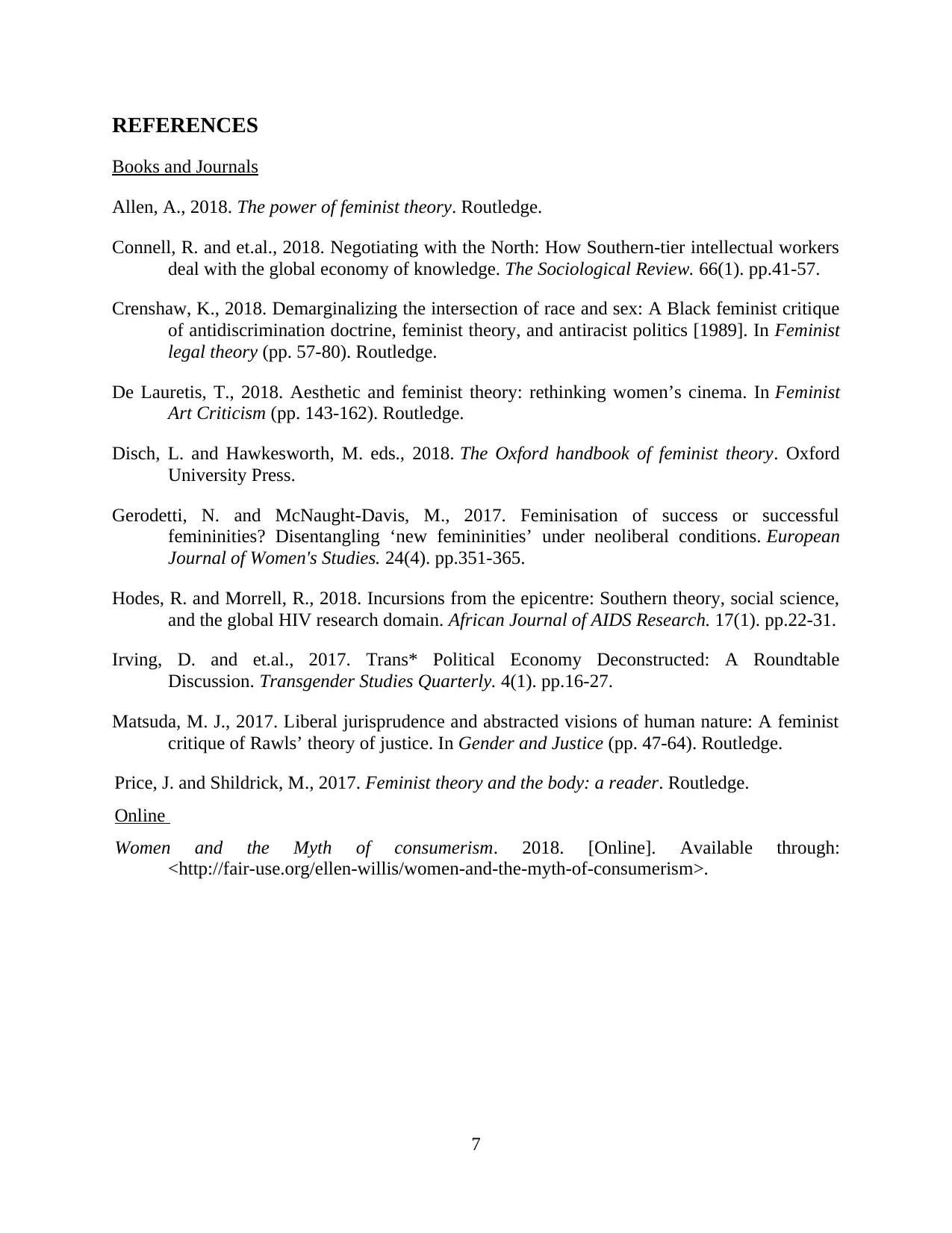
REFERENCES
Books and Journals
Allen, A., 2018. The power of feminist theory. Routledge.
Connell, R. and et.al., 2018. Negotiating with the North: How Southern-tier intellectual workers
deal with the global economy of knowledge. The Sociological Review. 66(1). pp.41-57.
Crenshaw, K., 2018. Demarginalizing the intersection of race and sex: A Black feminist critique
of antidiscrimination doctrine, feminist theory, and antiracist politics [1989]. In Feminist
legal theory (pp. 57-80). Routledge.
De Lauretis, T., 2018. Aesthetic and feminist theory: rethinking women’s cinema. In Feminist
Art Criticism (pp. 143-162). Routledge.
Disch, L. and Hawkesworth, M. eds., 2018. The Oxford handbook of feminist theory. Oxford
University Press.
Gerodetti, N. and McNaught-Davis, M., 2017. Feminisation of success or successful
femininities? Disentangling ‘new femininities’ under neoliberal conditions. European
Journal of Women's Studies. 24(4). pp.351-365.
Hodes, R. and Morrell, R., 2018. Incursions from the epicentre: Southern theory, social science,
and the global HIV research domain. African Journal of AIDS Research. 17(1). pp.22-31.
Irving, D. and et.al., 2017. Trans* Political Economy Deconstructed: A Roundtable
Discussion. Transgender Studies Quarterly. 4(1). pp.16-27.
Matsuda, M. J., 2017. Liberal jurisprudence and abstracted visions of human nature: A feminist
critique of Rawls’ theory of justice. In Gender and Justice (pp. 47-64). Routledge.
Price, J. and Shildrick, M., 2017. Feminist theory and the body: a reader. Routledge.
Online
Women and the Myth of consumerism. 2018. [Online]. Available through:
<http://fair-use.org/ellen-willis/women-and-the-myth-of-consumerism>.
7
Books and Journals
Allen, A., 2018. The power of feminist theory. Routledge.
Connell, R. and et.al., 2018. Negotiating with the North: How Southern-tier intellectual workers
deal with the global economy of knowledge. The Sociological Review. 66(1). pp.41-57.
Crenshaw, K., 2018. Demarginalizing the intersection of race and sex: A Black feminist critique
of antidiscrimination doctrine, feminist theory, and antiracist politics [1989]. In Feminist
legal theory (pp. 57-80). Routledge.
De Lauretis, T., 2018. Aesthetic and feminist theory: rethinking women’s cinema. In Feminist
Art Criticism (pp. 143-162). Routledge.
Disch, L. and Hawkesworth, M. eds., 2018. The Oxford handbook of feminist theory. Oxford
University Press.
Gerodetti, N. and McNaught-Davis, M., 2017. Feminisation of success or successful
femininities? Disentangling ‘new femininities’ under neoliberal conditions. European
Journal of Women's Studies. 24(4). pp.351-365.
Hodes, R. and Morrell, R., 2018. Incursions from the epicentre: Southern theory, social science,
and the global HIV research domain. African Journal of AIDS Research. 17(1). pp.22-31.
Irving, D. and et.al., 2017. Trans* Political Economy Deconstructed: A Roundtable
Discussion. Transgender Studies Quarterly. 4(1). pp.16-27.
Matsuda, M. J., 2017. Liberal jurisprudence and abstracted visions of human nature: A feminist
critique of Rawls’ theory of justice. In Gender and Justice (pp. 47-64). Routledge.
Price, J. and Shildrick, M., 2017. Feminist theory and the body: a reader. Routledge.
Online
Women and the Myth of consumerism. 2018. [Online]. Available through:
<http://fair-use.org/ellen-willis/women-and-the-myth-of-consumerism>.
7
⊘ This is a preview!⊘
Do you want full access?
Subscribe today to unlock all pages.

Trusted by 1+ million students worldwide
1 out of 9
Related Documents
Your All-in-One AI-Powered Toolkit for Academic Success.
+13062052269
info@desklib.com
Available 24*7 on WhatsApp / Email
![[object Object]](/_next/static/media/star-bottom.7253800d.svg)
Unlock your academic potential
Copyright © 2020–2026 A2Z Services. All Rights Reserved. Developed and managed by ZUCOL.





